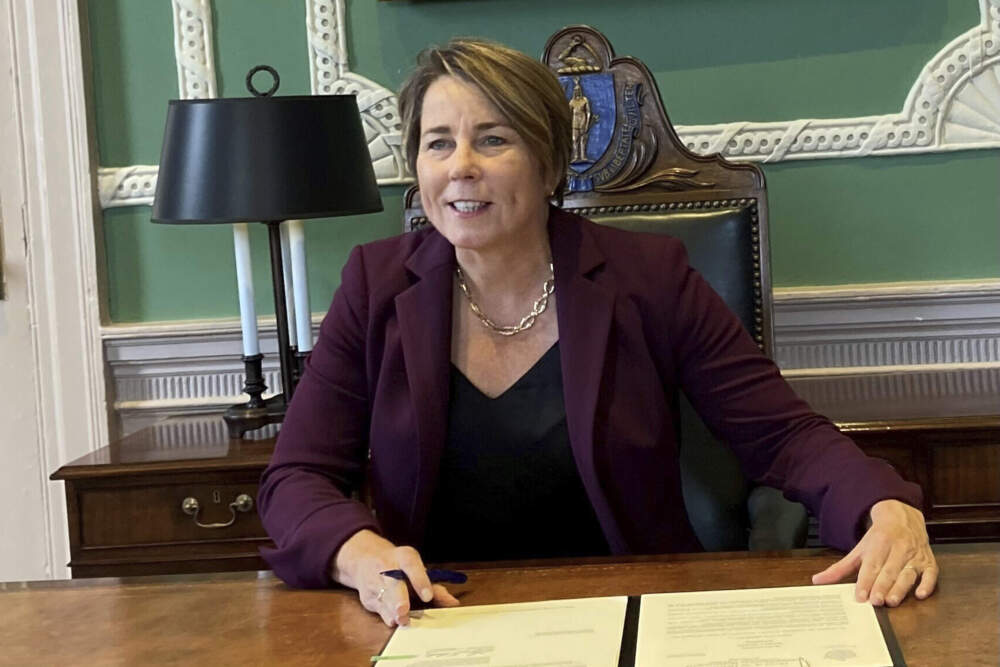Advertisement
Boston's Morning Newsletter
3 things to know about Gov. Maura Healey's new guidelines for pardons

Editor's Note: This is an excerpt from WBUR's daily morning newsletter, WBUR Today. If you like what you read and want it in your inbox, sign up here.
It’s the first day of November. And while not everyone is ready for the approaching holiday season, we could see a little snow in some parts of Massachusetts today.
But first, we have a flurry of news to get to:
Pardon me: Gov. Maura Healey has recommended more pardons (13) in her first year in office than any Massachusetts governor since Michael Dukakis. And now, she’s rewriting the books on which Bay Staters convicted of a crime should get relief from their sentence. During an interview yesterday on Radio Boston, the Democrat announced new clemency guidelines to “explicitly outline” how governors should grant pardons and commutations going forward. Here are the three main pillars of the new guidelines:
- The first big tenet of Healey’s guidelines addresses “unfairness and systemic bias” in the criminal justice system. For starters, that means considering whether justice was miscarried or if the person got a particularly harsh sentence compared to others convicted of the same crime. But it also means taking into account whether the person is a member of a group that has faced unequal treatment from the justice system. According to the guidelines, those groups include racial minorities, migrants, veterans, people with disabilities, women, people in poverty and those who identify as LGBTQ+.
- Another factor Healey will take into account: Age. The guidelines note a person’s “age, maturity and intellectual abilities” at the time of their offense “may be mitigating factors that support granting of clemency” due to research showing that one’s brain isn’t fully developed until well into their 20s.
- Finally, Healey says what a person does in jail after their conviction should matter. “Our character can be measured by a collection of actions over time, accounting without hesitancy for the worst things we have done but also owning responsibility for what we do next,” the guidelines say. That includes taking accountability and showing remorse. But the guidelines also say Healey won’t ding petitioners who continue to plead innocence. Their “unwillingness to accept responsibility for an offense may sometimes reflect the petitioner’s actual innocence rather than any shirking of responsibility for past actions,” the guidelines say.
Waiting game: Healey’s administration also filed emergency regulations yesterday to alter the state’s family shelter system without approval from lawmakers, as they prepare to enforce a 7,500-family cap on the system. WBUR’s Gabrielle Emanuel reports the regulations will not only allow state officials to create and run a waitlist in the family shelter system, but also limit how long families can stay. The regulations would also let the state give priority to families with “medical vulnerability” or domestic violence risks.
- What’s next: The new regulations were made public just before a court hearing yesterday on a lawsuit challenging the legality of the Healey administrations’ changes to the state’s right-to-shelter law. The judge is expected to rule by today.
- Listen: What happens if the waitlist does take effect? Emanuel recently met a family that didn’t get into a shelter (before the waitlist was implemented).
The Boston Jewish Film Festival gets underway today, with in-person screenings at a number of local theaters through Nov. 12. And with the ongoing Israel-Hamas war, festival organizers say they’ll have security measures in place at all their venues. “Never before have I felt nervous about being here,” Ken Shulman, the festival’s board chair, told WBUR’s Amy Sokolow. At the same time, he called the celebration of the Jewish community “beyond meaningful.”
- The festival comes after the Boston Palestine Film Festival canceled its live screenings last month due to security and sensitivity concerns in the wake of the Israel-Hamas conflict.
Vamos a la playa: State officials say multilingual signs at beaches in Greater Boston will be installed by next summer — at least a year behind schedule. Officials say the signs will communicate beach rules and water safety information. (Currently, most beaches only have QR codes to translate physical, English-only signage.)
- The backdrop: The effort comes after a report earlier this year said DCR needs to do more to make beaches more accessible for people of color, non-English speakers and people with disabilities.
P.S.— WBUR’s Circle Round team is gearing up for the holiday season with some new gifts for fans of the show. In addition, this coming year, the podcast is circling round the U.S. on its first national tour! The new holiday swag and tour details are all available at this link.
